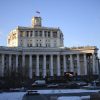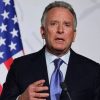One of the most significant police trials in US history begins on Monday and as the former officer who killed George Floyd stands before a judge, a jury and the world, many in Black communities in Minneapolis are braced against the dread of justice not being served.
Minneapolis and its adjacent “twin city” St Paul, followed by cities and towns all across the United States and overseas burst into civil rights protest last May, where millions demanded radical change after a video went viral showing a cop kneeling on Floyd’s neck for eight minutes and forty-six seconds as he begged, in vain, for his life.
The since-fired officer, Derek Chauvin, who is white, is charged with second degree murder and second degree manslaughter and has been in hiding while out on bail.
Three other, also now-ex, officers charged with aiding and abetting stand trial together in August.
“I feel kind of scared that we won’t see [what] we want to see. And we’ll be in the streets, like we were the whole summer,” said Zarieah Graves, an activist in Minneapolis.
If the officers are acquitted, or convicted but lightly punished “we are going to be upset,” Graves added.
When Floyd, 46, a father from Houston who moved to Minneapolis for work, was killed his name joined that of Jamar Clark, Philando Castile and many others less well known.
More than 200 people have suffered police-involved deaths in Minnesota in the last 20 years, a database compiled by the Minneapolis Star Tribune calculated. While only 7% of Minnesotans are Black they accounted for 26% of those deaths.
“That’s what people need to know is that there are hundreds of George Floyds out there in the state of Minnesota alone, that people just don’t seem to know anything about,” Toshira Garraway told the Guardian.
Garraway started the activist group Families Supporting Families Against Police Violence when Justin Teigen, her fiancé and the father of her child, ended up suffocated in a recycling truck after he fled from a police stop in St Paul in 2009 and was pursued, with the authorities and the family disagreeing over how he came to meet his death.
But only one Minnesota police officer has been convicted of murder – Mohamed Noor, who shot dead Australian life coach Justine Damond after she called police saying she had witnessed an assault in 2017. Damond was white and Noor is Somali American.
“Why is it that only the white woman got true justice?” Garraway asked.
The sight of other officers not being charged or walking free over the years had “violated community trust”, she added. Noor has appealed.
For many, the statistics don’t generate confidence in the court, despite the report last month that Chauvin was initially set to admit third degree murder.
“I think people and the police expect that they can do what they want without action, consequences or accountability because of their position of power and their position in our society,” Graves said
Chauvin’s trial begins with an unusually long three weeks set aside for jury selection.
Downtown in Minneapolis and St Paul, government buildings are blocked off with concrete barriers, chain link fencing and barbed wire. Several thousand officers from various agencies, including 2,000 national guard members, will be on hand in the event of unrest, although the authorities have pledged to allow peaceful demonstrations.
The trial will be painful, not only the replaying in excruciating detail of Floyd’s prolonged suffering but also the defense’s expected attempts to use factors such as the drugs found in his system to denigrate him.
Astonishingly, relatives of Floyd have been allocated a total of only one seat in court.
Bigger issues than the fate of individual officers are at stake. Two weeks after Floyd’s killing, a majority on Minneapolis city council members pledged to “begin the process of ending” the police department, saying it “cannot be reformed” and would be replaced with a new system of public safety.
It was the kind of change that the protests were about: calls to end brutal, racist policing and entrenched racism more broadly, and to defund law enforcement began sweeping the US.
But in short order the Minneapolis pledge ran into legal barriers at city and state level, as well as pushback from some police reform activists who said a proposed amendment to the city’s charter to remove the police department was too vague and didn’t reflect feedback from the wider community.
Nine months on, a group of council members are gathering feedback on a revised charter amendment proposal that, once again, would eliminate Minneapolis’s police department, but include police officers in a new department of public safety.
Some reforms happened – bans on “no-knock” search warrants, chokeholds and neck restraints. New policies strengthen the requirements to intervene when excessive force is used and limit who can authorize use of crowd-control weapons.
The 2021 Minneapolis budget diverted $7.7m from the police department to crime prevention initiatives, including a mental health co-responder program and the city’s office of violence prevention, which will now take calls regarding thefts and property damage.
“Developing a culture within law enforcement that doesn’t produce ‘us versus them’ aspects of policing” will be key going forward, said Tanya Gladney, a sociology and criminal justice professor at the University of St Thomas in St Paul and a member of a statewide board that oversees police standards.
“So even when it comes to reform, police officers are on board as well, instead of reform being seen as a threat to officer safety,” Gladney added.
The state legislature passed a bill last July that included restrictions on chokeholds and a ban on “warrior-style” police training. It requires officers to intervene if another officer uses excessive force and strengthens processes for reporting and investigating misconduct.
“They’re not moving fast enough at all. It’s embarrassing that no major reforms have happened here, and they’re passing George Floyd bills in other states,” said Trahern Crews, spokesperson for Black Lives Matter-Minnesota.
Nationally, the House passed the expansive George Floyd Justice in Policing Act last week, , seeking to ban racial and religious profiling. It stalled in the Senate last year but Joe Biden said he’ll sign if it makes it to his desk.
“Black communities have suffered from police abuse for as long as we’ve been here,” the California Democratic congresswoman Karen Bass, who reintroduced the bill, told Essence.
Violent crime in Minneapolis increased by 21% in 2020, mirroring a national trend. A 15-year high of 533 people reported being hit by gunfire, up from 269 in 2019.
A similar crime surge occurred in Ferguson, Missouri, following the 2014 police killing of Michael Brown, according to an analysis from the Council on Criminal Justice and Arnold Ventures.
This could be traced to “a pullback in proactive law enforcement by officers who fear they will be unfairly scrutinized”, or to communities drawing “away from police due to breached trust and lost confidence”, the report said, which also cited the strain of the coronavirus pandemic and related financial hardship.
“There are going to be some people who are, like, we need more police because there’s more crime. But other people, such as myself, would like to take a more holistic approach,” said Crews.
Since June, around 200 of the roughly 800 officers have left the department or taken extended leave.
Bob Kroll, the police union leader thought instrumental in blocking attempts to change the department’s culture, retired in January.
The city council recently voted to begin hiring more officers, expecting to have 674 by the end of the year.
As the spring and summer trials beckon, Minneapolis is back on edge.
“I’m nervous, I’m mentally prepared for the worst,” said Brandyn Tulloch, a Minnesota activist and organizer.
Protests and even riots won’t surprise him. Even a conviction of Chauvin is less important than preventing more brutality.
“Until we have a system that doesn’t allow state sanctioned police killings, it’s only a matter of time until we’re in this situation again,” he said.






















































Свежие комментарии